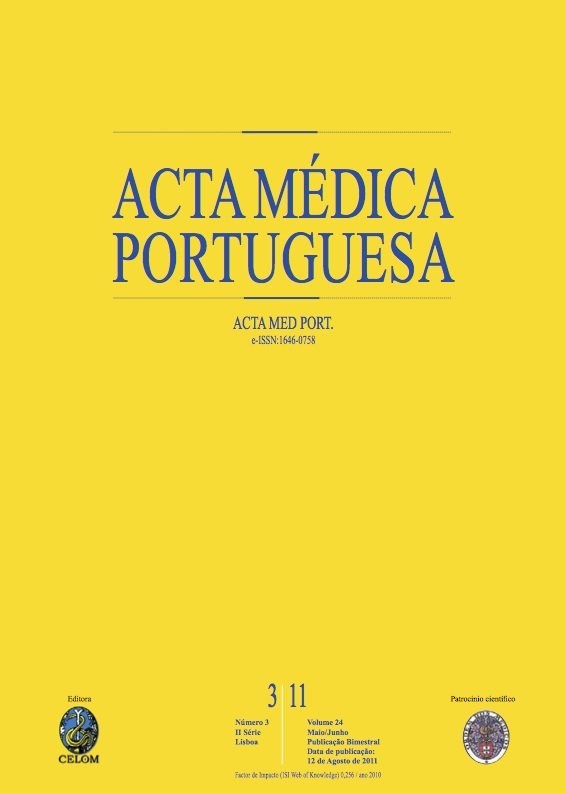Meningite bacteriana pós-traumática em idade pediátrica: análise de onze anos.
DOI:
https://doi.org/10.20344/amp.467Resumo
Traumatic brain injury is a frequent reason for admission at pediatric emergency services. In severe cases, with basilar skull fracture, bacterial meningitis is a serious and potentially fatal complication to be considered.To describe clinical and laboratory features, bacteriology and outcome of children with post-traumatic meningitis, and evaluate the proportion of meningitis in the population who suffered head trauma.Retrospective review of medical records of children with this diagnosis admitted to a level 3 pediatric hospitals in the Central Region of Portugal, contextualized in the evaluation of the number of head injuries, fractures and cerebrospinal fluid leakages, during a 11-year period (January 1999 to December 2009).Four children were identified, corresponding to 0,7% of the children with skull fractures, 4,1% of children with basilar skull fractures and 13,8% of those with documented cerebrospinal fluid leakage. Three were boys, with a median age of 8 years (2-10 years). The median time between head trauma and meningitis was 1,1 years (3 days-3,4 years). In all cases a basilar skull fracture was identified and cerebrospinal fluid leakage documented. Two children required surgery. Streptococcus pneumonia was the pathogen identified in two cases with positive cerebrospinal fluid culture. One child died and other has post-traumatic peripheral facial palsy.Bacterial meningitis is a complication to be considered in head injury with basilar skull fracture, particularly when associated with cerebrospinal fluid leakage, even though the injury occurred several years earlier, and is usually a serious condition. One of our children died. Similar to what is described, S. pneumoniae was the most common bacteria, and this fact supports that children with head trauma and cerebrospinal fluid leakage should receive pneumococcal vaccine. The follow-up of these children requires constant vigilance and should include a multidisciplinary approach.Downloads
Downloads
Como Citar
Edição
Secção
Licença
Todos os artigos publicados na AMP são de acesso aberto e cumprem os requisitos das agências de financiamento ou instituições académicas. Relativamente à utilização por terceiros a AMP rege-se pelos termos da licença Creative Commons ‘Atribuição – Uso Não-Comercial – (CC-BY-NC)’.
É da responsabilidade do autor obter permissão para reproduzir figuras, tabelas, etc., de outras publicações. Após a aceitação de um artigo, os autores serão convidados a preencher uma “Declaração de Responsabilidade Autoral e Partilha de Direitos de Autor “(http://www.actamedicaportuguesa.com/info/AMP-NormasPublicacao.pdf) e a “Declaração de Potenciais Conflitos de Interesse” (http://www.icmje.org/conflicts-of-interest) do ICMJE. Será enviado um e-mail ao autor correspondente, confirmando a receção do manuscrito.
Após a publicação, os autores ficam autorizados a disponibilizar os seus artigos em repositórios das suas instituições de origem, desde que mencionem sempre onde foram publicados e de acordo com a licença Creative Commons









